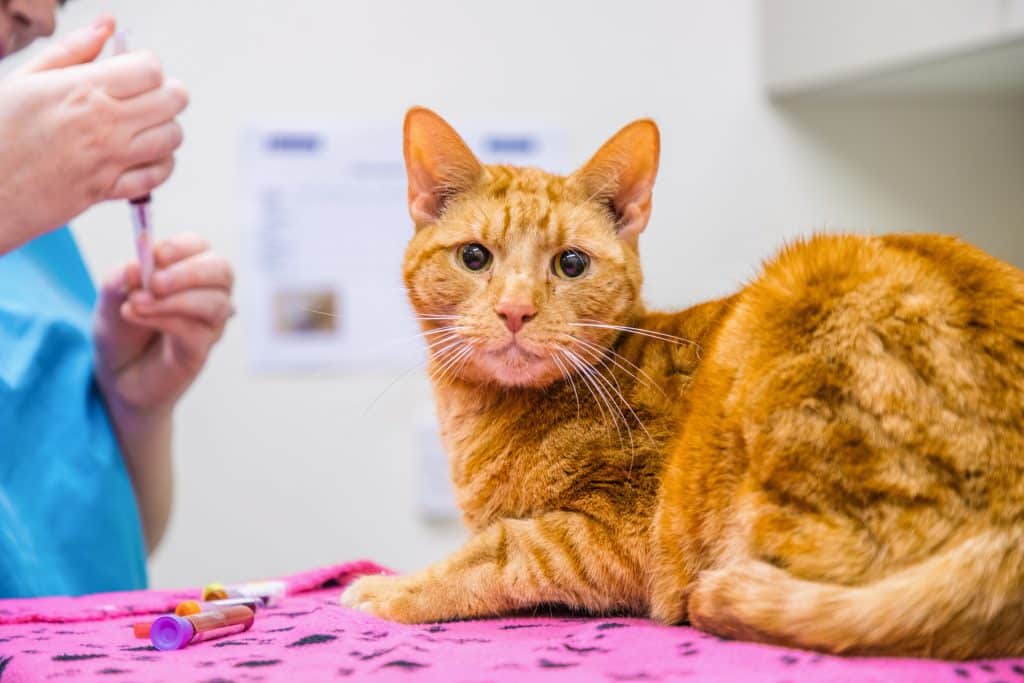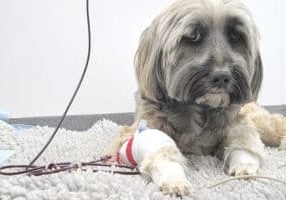
The treatment of feline infectious peritonitis (FIP) has been revolutionised in recent years. FIP has evolved from a universally fatal condition, to one where we achieve very high treatment response rates, and excellent long-term prognoses. Treatment has been legally available in the UK since 2021, and since then the medicine team at NDSR have been privileged to help many FIP patients. We are however still early in this new era of successful FIP treatment, and our understanding of the nuances of treatment continue to evolve. In this article we share with you the latest thinking on the treatment of FIP.
Treatment regime: injectable vs oral
Initially the recommendation was to start injectable treatment (Remdesivir injectable), before transitioning onto oral treatment (GS441524 tablets or oral suspension). The injectable treatment is more expensive and can cause unpleasant side effects when administered subcutaneously. Injectable treatment also requires hospitalisation. Recent experience suggests that oral treatment can be used from the initiation of FIP treatment. Injectable treatment is therefore now reserved for those cats who cannot be medicated orally (for example due to severe neurological signs).
Dose variations
Dose is determined by the location of the patient’s FIP within the body. Cases with CNS or ocular involvement require higher doses to achieve effective drug levels in these sites.
Current recommendations are for GS441524 to be given twice daily (split dose) rather than once daily, as this approach optimises serum levels of GS441524.
| FIP manifestation | GS441524 dose (orally) | Equivalent remdesivir dose (if injectable medication is indicated by patient presentation) |
| Effusions, no CNS or ocular manifestations | 6-7.5 mg/kg PO BID | 10 mg/kg IV/ SC SID |
| No effusions, no CNS or ocular manifestations | 6-7.5 mg/kg PO BID | 12 mg/kg IV/SC SID |
| Ocular manifestations present | 7.5-10 mg/kg PO BID | 15 mg/kg IV/SC SID |
| CNS manifestations present | 10 mg/kg PO BID | 20 mg/kg IV/SC SID |
There is also accumulating evidence that individual cats may require dose adjustments of GS441524 to achieve effective treatment, as there seem to be clinically important variations in the absorption of GS441524. The University of Edinburgh are performing therapeutic drug monitoring (TDM) to learn more. In individual cats with a poor response to treatment or relapse, reduced GI absorption may be an important contributor, and TDM would be advisable to investigate further. More information can be sought from the University of Edinburgh: https://www.ed.ac.uk/vet/services/easter-bush-pathology/research/research-articles/there-is-hope-for-cats-with-fip
Please note that an important cause of FIP treatment failure is neglecting to maintain the patient’s intended dose (mg/kg) due to increase in patient weight in young growing animals. We would recommend patients are weighed weekly at home (owners can buy baby scales at relatively small cost), and their weights reported to us, so we can ensure that the dose remains adequate (mg/kg) at all times.
Treatment duration
The current recommendation is that FIP cases are treated for 84 days (12 weeks). This recommendation was derived from Neils Pedersen’s 2018 work on a similar anti-viral compound (GC376). Reports of cats treated with shorter treatment courses are present in the literature, but large case series have not yet been published. A recent small series of 19 cats treated with a 42-day course of treatment showed no difference in outcome when compared to the control group treated with a standard 84-day course. Only 1/19 cats of the cats treated with the shorter course of treatment had CNS manifestations of FIP and none had ocular manifestations of the disease; we know that CNS and ocular manifestations of disease are more challenging to treat due to issues achieving good drug concentrations in these sites. Given the potential implications on patient morbidity and mortality, and treatment cost (relapse triggers a second full course of GS441524), our recommendations at this point continue to be an 84-day course of anti-viral medication. If finances render this impossible, shorter courses (at full dose) could be considered, but there is not enough information available at this time to determine what impact this might have on response rate, relapse rate or long-term outlook.
GS441524 as a diagnostic treatment trial
FIP can be challenging to definitively diagnose. GS441524 seems to be a very well-tolerated medication, and response to treatment is typically rapid (improvement in demeanour and resolution of fever within 2-3 days). Using GS441524 as a “treatment trial” in suspected FIP cases is thus a valid consideration in some situations (very sick patient, suggestive findings, diagnostic results pending, etc). A lack of response does not exclude FIP as a diagnosis, however: around 15% of patients don’t respond to treatment, and a small subset of patients do take longer to respond (7-10d for clinical improvement). Effusions are expected to have resolved within 2 weeks of treatment, but some of the clinicopathological changes may also take longer to improve. Globulin concentrations can in fact increase in the early stages of treatment, likely due to their systemic resorption from large volume effusions.
Long-term outlook for responders
Around 85% of patients are successfully treated with a 12-week course of anti-viral medication. Relapse is uncommon (<10%), but can occur during treatment, or thereafter (most commonly within the first few weeks of treatment discontinuation). Long-term outlook for successfully treated cats appears to be excellent, but as this medication has only been available for a few years, protracted outlook data continue to emerge. Moving from a time just a few years ago, where FIP was considered universally fatal, to following long-term survivors is a wonderful position to be in though!
Footnote:
GS441524 can be sourced from BOVA UK as tablets or oral suspension: https://bova.co.uk/
References:
An update on treatment of FIP using antiviral drugs in 2024: growing experience but more to learn. Taylor et al, 2024. https://icatcare.org/app/uploads/2024/03/FIP-update-Feb-2024.pdf.
Retrospective study and outcome of 307 cats with feline infectious peritonitis treated with legally sourced veterinary compounded preparations of remdesivir and GS-441524 (2020–2022). Taylor et al, JFMS 2023
Thirty-two cats with effusive or non-effusive feline infectious peritonitis treated with a combination of remdesivir and GS441524. Green et al, JVIM 2023
Short treatment of 42 days with oral GS441524 results in equal efficacy as the recommended 84-day treatment in cats suffering from feline infectious peritonitis with effusion- a prospective randomised controlled study. Zuzzi-Krebitz et al, Viruses 2024.
Efficacy of a 3C-like protease inhibitor in treating various forms of acquired feline infectious peritonitis. Pedersen et al, JFMS 2018
Case Advice or Arranging a Referral
If you are a veterinary professional and would like to discuss a case with one of our team, or require pre-referral advice about a patient, please call 01883 741449. Alternatively, to refer a case, please use the online referral form
About The Discipline
Internal Medicine

Need case advice or have any questions?
If you have any questions or would like advice on a case please call our dedicated vet line on 01883 741449 and ask to speak to one of our Internal Medicine team.
Advice is freely available, even if the case cannot be referred.
Internal Medicine Team
Our Internal Medicine Team offer a caring, multi-disciplinary approach to all medical and surgical conditions.